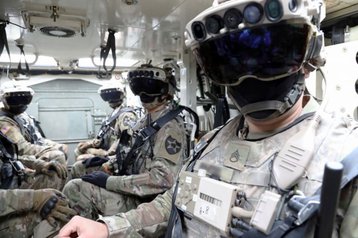Anduril has taken over the US Army's Integrated Visual Augmentation System (IVAS) program to build augmented headsets for soldiers.
Microsoft originally won the $22 billion contract back in 2021, building off of its work with HoloLens. The contract included cloud and Edge services provided by Microsoft.
Now, after multiple delays, hardware challenges, Congressional blocks, and complaints from soldiers, Microsoft has proposed handing over industry leadership of the project to military contractor Anduril.
Pending Department of Defense approval, it will mean that Anduril will take over oversight of production, future development of hardware and software, and delivery timelines.
Microsoft Azure will remain the "preferred hyperscale cloud" provider for IVAS workloads, as well as other Anduril AI technologies. The two companies partnered last year to incorporate Anduril's Lattice AI into IVAS systems.
Neither company mentioned who would handle Edge computing, with Anduril deploying its own Edge hardware for other projects, including its Menance line of command-and-control centers and its Sentry tower product line.
Last year, the company said that it would use Oracle Cloud and Edge compute for Lattice. The Lattice platform aims to eventually become a single operating system across disparate weapons and sensors, providing a single plane for understanding and responding to a complex battle scenario. The OCI Roving Edge is also being integrated into Menace.
"Microsoft has some pretty extraordinary things in the pipe on the AI and cloud computing side that will continue to power IVAS," Anduril founder Palmer Luckey said in a blog post.
"Tactical heads-up-displays that turn warfighters into technomancers and pair us with weaponized robotics were one of the products in the original Anduril pitch deck for a reason. The past eight years we have spent building Lattice have put Anduril in a position to make this type of thing actually useful in the way military strategists and technologists have long dreamed of, ever since Robert Heinlein’s 1959 novel Starship Troopers. Not just day and night and thermal and ultraviolet, but peering into an idealized interactive real-time composite of past, present, and future that will quickly surpass traditional senses like vision and touch."
Luckey is the founder of virtual reality headset company Oculus VR, which was acquired by Facebook (now Meta) for $2 billion in 2014. After falling out with CEO Mark Zuckerberg in 2017, Luckey left to found Anduril alongside former Palantir Technologies executives Matt Grimm, Trae Stephens, and Brian Schimpf.
It has since won billions in military contracts, including involvement in the Air Force's Advanced Battle Management System.




